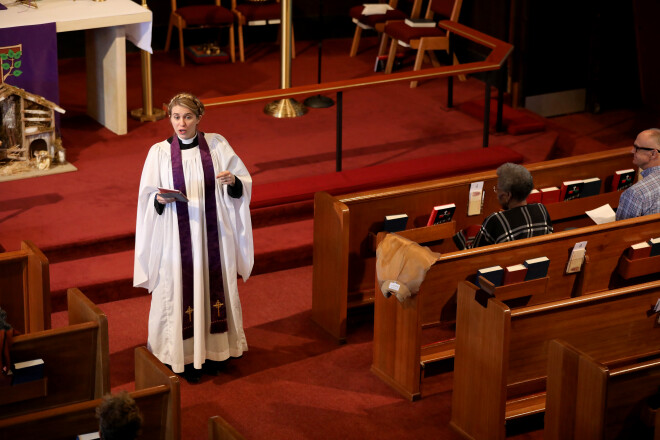Reinhold Niebuhr once quipped that sin was the only ‘empirically verifiable’ claim in the Creed. If its profession may be easier than we would at first suppose, then that of the Church is surely harder. In what sense do we ‘believe in’ it? Isn’t belief reserved for God? And don’t we all have at some level a running complaint with the Church, whether it be as a result of scandal, or conflict, or garden-variety inertia and hypocrisy? We can clarify the matter in this way: we ‘believe in the Church’ precisely as a form or re-expression of our belief in God. But insofar as it begins to be something we could ‘believe in’ over against faith in God it would be invalid. In other words, what is the relation between our faith in the Church and our protest against it, both in relation to our faith preeminently in God?
In answer, consider Paul’s description in II Corinthians 4:7-9: the Church as the broken clay pot in which the treasure is found. Now his primary meaning is the weakness of the Church, its proneness to persecution and suffering, so that its dependence on God will be clearer. But you might equally apply the image to its shortcomings. The Church is broken, and yet it is the place where God chooses to put the treasure of the Gospel. Both are true at once. Insofar as it is broken, we must be honest about its flaws. But we cannot scorn it, since it is also where He wills us to find the Gospel of grace. It too is twofold. There is by divine design no way around it, and, anyway, its flaws are…ours. At the very least we are disbarred from exempting the Church from critique, and from supposing we can stay home with our Bibles and suppose we are leading Christian lives as the New Testament imagines them.
So we need to at once sing the Church’s praise, and submit it (us) to strong criticism. It is where we find the surpassing good in comparison to which all our own claims are so much dross (Philippians 3:8). But it rightly received a harsh verdict embedded in our own liturgies (Ash Wednesday Litany of Penitence, congregation’s part in Palm Sunday Gospel, Solemn Collects for Good Friday). It is both at once, seen on the one hand in the light of God and in the other on our own.
Before we end this reflection, we should add that often our critique of the Church ought to be a critique of ourselves. We use affronts as excuses to be lapsed. Or we turn the Church into a spiritual consumer product we can take or leave. We here too have seen the enemy and it is us. In these ways the Church becomes an occasion to challenge us and our resistance, and hence is exactly something we are called to ‘believe in.’
In a less polemical mood, we can at least say this. The Church is always twofold. It is a human organization open to all the kinds of assessment we might submit it to, organizational, sociological, economic, etc. This is part of what we mean by saying ‘broken clay pot.’ But it is also more than and different than this, since God has taken that pot and put something within it which cannot be defined in these terms, something of limitless price for which one would sell a whole field to gain it.
For discussion: in what sense is the Church, as faithful humanity collectively and not just individually, also ‘at once justified and a sinner’? What does this mean as you look at the actual life of the Church? How do you see each?




